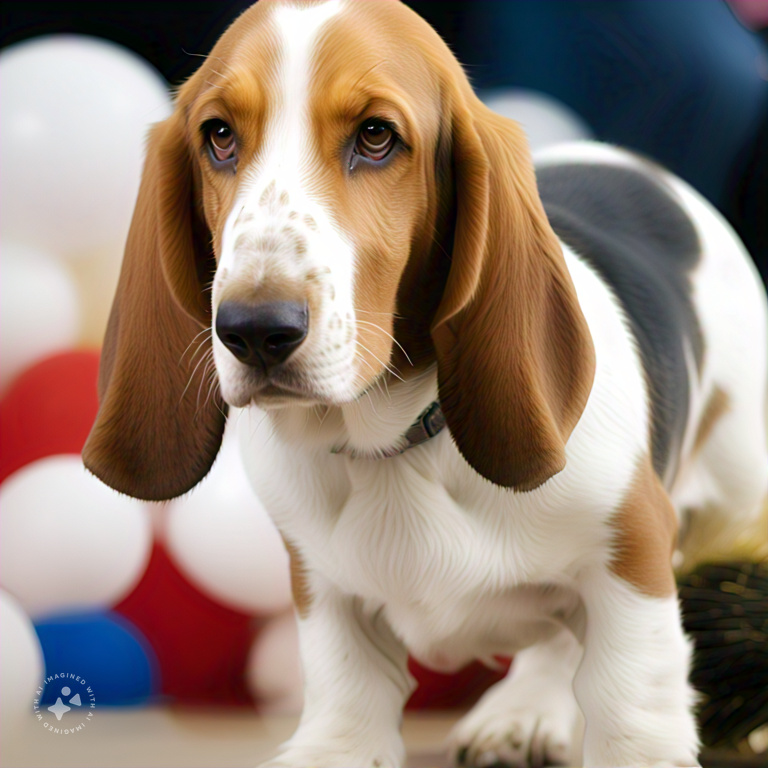Introduction
Basset Hounds are popular dogs with their long ears, droopy eyes, and big hearts. They are known for being loyal and gentle, making them great family pets. Whether you’re thinking about getting a Basset Hound or just curious about them, this guide covers their personality, health needs, and how to take care of them.
Table of Contents
- History of the Basset Hound
- What They Look Like
- Personality and Temperament
- Common Health Problems
- Grooming Needs
- Training Tips
- Exercise Needs
- Feeding and Nutrition
- Is a Basset Hound Right for You?
- Conclusion
1. History of the Basset Hound
Basset Hounds come from France, where they were first used for hunting small animals like rabbits. With their strong sense of smell, they could follow scents for long distances. Later, Basset Hounds became popular in England and the United States, where people loved their calm nature and excellent tracking skills.
2. What They Look Like
Basset Hounds have a unique look with their short legs, long body, and droopy ears.
- Height: Around 11 to 15 inches tall.
- Weight: Typically 40 to 65 pounds.
- Coat: Short, smooth fur that is often tricolored (black, white, and brown).
- Ears: Very long, often dragging near the ground, which helps them pick up scents.
- Body: Long and low, giving them a unique shape.
Basset Hounds have powerful bodies and are built to move through thick brush and rough ground, even though they are short.
3. Personality and Temperament
Basset Hounds are known for being friendly, calm, and loving. They are wonderful family pets and usually get along well with kids and other animals.
- Friendly: They enjoy being with people and other pets.
- Laid-back: Bassets are calm and don’t need a lot of excitement to be happy.
- Stubborn: Bassets can be a bit stubborn, so training might take some patience.
- Loyal: Bassets are very loyal to their families and love spending time with them.
Their easygoing nature makes them popular pets, but their stubbornness can make training a bit of a challenge.
4. Common Health Problems
Basset Hounds are generally healthy, but like all dogs, they can have some health issues. Regular vet visits and good care can help prevent or manage these problems.
Common Health Issues:
- Ear Infections: Their long ears make them more likely to get ear infections, so they need regular cleaning.
- Hip Dysplasia: This is a joint issue that can cause pain as they get older.
- Obesity: Bassets love food and can gain weight easily, which can stress their bones and joints.
- Bloat: This is a serious condition where the stomach twists and can be life-threatening.
- Back Problems: Because of their long bodies, Bassets can develop back problems.
Prevention Tips: Regular check-ups with the vet, a balanced diet, and controlled exercise help keep Basset Hounds healthy. Clean their ears and teeth regularly to prevent infections and other issues.
5. Grooming Needs
Basset Hounds have short coats but still need regular grooming.
- Brushing: Brush them once a week to help with shedding and keep their coat shiny.
- Ear Cleaning: Their ears need regular cleaning to prevent infections.
- Nail Trimming: Keep their nails trimmed to avoid overgrowth, which can be painful.
- Teeth Brushing: Brushing their teeth can help avoid bad breath and gum disease.
With regular grooming, Basset Hounds will stay clean and comfortable.
6. Training Tips
Training a Basset Hound can be tricky because of their independent nature. Here are some tips to make training easier:
- Start Young: It’s best to start training when they’re puppies.
- Be Patient: Basset Hounds are smart, but they can be stubborn, so patience is key.
- Use Rewards: Reward-based training with treats and praise works well.
- Socialize Early: Introducing them to new people and animals helps them become friendly and well-mannered.
- Leash Training: Bassets like to follow scents, so leash training is important to prevent them from wandering off.
With patience and consistency, Basset Hounds can be trained to follow commands and behave well.
7. Exercise Needs
Basset Hounds don’t need a lot of exercise, but regular activity is important to keep them healthy.
- Daily Walks: One or two moderate walks each day are usually enough.
- Playtime: Games that involve sniffing and exploring can be fun for them.
- Avoid High Jumps: Because of their back structure, avoid activities that put stress on their spine.
Exercise helps them stay at a healthy weight and keeps them active and happy.
8. Feeding and Nutrition
Feeding your Basset Hound a balanced diet is important to keep them healthy and prevent weight gain.
- Control Portions: Bassets can gain weight easily, so portion control is important.
- High-Quality Food: Choose food that has a balance of protein, carbs, and fats.
- No Table Scraps: Avoid feeding them human food to prevent bad habits and health issues.
Good nutrition supports their health and energy levels, helping them lead a long, happy life.
9. Is a Basset Hound Right for You?
Basset Hounds make great family pets because they are gentle and friendly. They are ideal for people who want a calm, loyal companion. However, they need regular grooming, training, and exercise. They are best suited to people who have the time and patience to meet their needs.
10. Conclusion
Basset Hounds are lovable dogs with unique looks and gentle personalities. They need moderate exercise, grooming, and patience in training, but if you’re willing to put in the time, they will reward you with loyalty and affection. Basset Hounds make excellent companions and bring joy and warmth to any family.
If you’re thinking of getting a Basset Hound, understanding their needs and temperament will help you provide them with a happy, healthy life.

